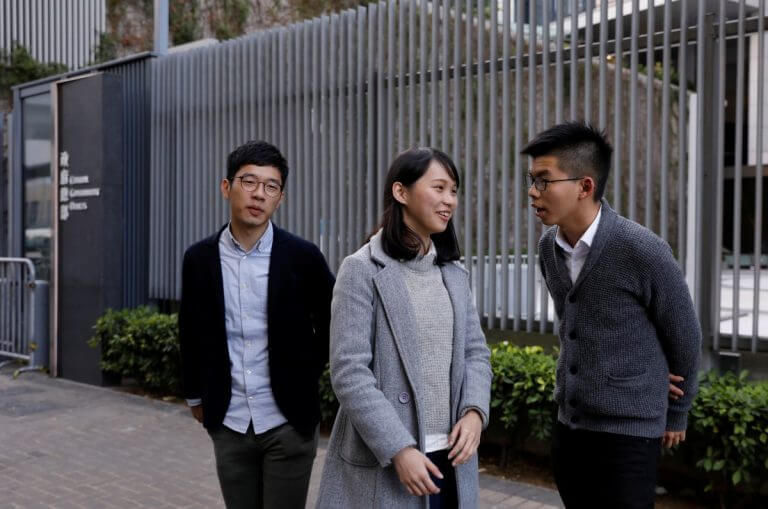
China, Hong Kong’s leader and other commentators have criticised the nomination of Hong Kong democracy campaigner Joshua Wong along with the so-called Umbrella Movement for the Nobel Peace Prize.
A group of US lawmakers from both the Democrat and Republican parties submitted a nomination for Wong as well as Nathan Law, Alex Chow and the entire Umbrella Movement to the Nobel Peace Prize Committee in Oslo, Norway last Thursday.
The 21-year-old Hong Kong Open University student was the founder of Scholarism, a now-defunct student organisation which protested pro-Communist China “moral and national education”. He played a key role in the 2014 Occupy Hong Kong protests against a ruling that only Beijing-endorsed candidates could run in the election for the city’s Chief Executive.
“Joshua Wong and his fellow pro-democracy advocates have been unflinching in their peaceful and principled commitment to a free and prosperous Hong Kong. They are an inspiration and their cause has reverberations far beyond their city,” said Senator Marco Rubio in a statement.
“This nomination could not be more timely as Hong Kong’s long-cherished autonomy continues to erode, and Umbrella Movement leaders face reprisals simply for espousing basic human rights and freedoms,” he said.

Protesters participate in the Umbrella Revolution in Mong Kok, Hong Kong on 8 October 2014. Source: Scott Wong/Shutterstock
Hong Kong is supposed to operate under a “One Country, Two Systems” arrangement from when handed to China from Britain in 1997. Pro-democracy advocates, however, have raised concern about Beijing’s rapidly creeping influence in recent years.
The US lawmakers praised the Umbrella Movement for their activism in the face of legal threats and “tremendous opposition from the Chinese Communist Party.”
Joshua Wong said that “I believe the nomination would show the international community and [Chinese President] Xi Jinping how the young generation will persist in fighting for democracy, even if we have to face imprisonment or a permanent ban from public office.”
In a statement released on Facebook, he said that: “at this critical juncture, we are ever more in need to join hands with the international community in defending Hong Kong as the bridgehead of democratic movements and the demonstration of the spirit and principle of democratic autonomy under One Country Two Systems.”
US Representative Chris Smith said “how fitting would it be for Hong Kong’s champions of freedom to receive the peace prize a year after the death of Nobel Laureate Liu Xiaobo,” referring to the Chinese dissident who died of liver cancer after being denied access to leave the country for treatment.
“It would be both a fitting tribute and a reminder that the struggle for democracy and rights are not alien to the people of mainland China, but an indelible part of their great history and culture—and an important part of their future,” he added.
Hong Kong’s leader Carrie Lam – who is accused by some within the pro-democracy camp of being a puppet of Beijing – criticised the decision, saying it was “regrettable for foreign politicians to meddle with the city’s affairs”.

Hong Kong Chief Executive Carrie Lam takes shakes hands with Chinese President Xi Jinping after she swore an oath of office on the 20th anniversary of the city’s handover from British to Chinese rule, in Hong Kong, China, July 1, 2017. Source: Reuters/Bobby Yip
A statement from China’s Foreign Ministry said that the protests had been “illegal from head to toe” and urged “the relevant US Congressmen to stop interfering in Hong Kong and China’s internal affairs, and do more to benefit the development of Sino-US ties rather than the opposite.”
An article in the Chinese Communist Party’s English language mouthpiece Global Times went further, declaring it was “ludicrous” to nominate “rabble rousers” for the accolade.
The editorial argued that the Umbrella Movement was not worthy of the Prize because it “severely violated Hong Kong’s laws and disturbed city order”, adding that: “even by Western standards, Wong and the others are too young. By nominating them for the Nobel Peace Prize, the West is adopting ‘pets’ – and it looks ludicrous.”
Even Yonden Lhatoo, Chief News Editor of leading Hong Kong newspaper South China Morning Post criticised the nomination, writing in an opinion piece that “the Nobel Peace Prize has long been a laughing stock, but it has now, to all intents and purposes, been reduced to a total political circus.”
“When will people looking at and judging Hong Kong from the outside realise that we have no martyrs for democracy here, only muppets masquerading as them. The only champions of peace and freedom in this city are the people of Hong Kong themselves who demand and enjoy it every day,” he wrote.
This article originally appeared on our sister website Asian Correspondent.
Liked This? Then you’ll love…
Politics is choking Hong Kong universities’ academic freedom
Students in Singapore, Japan and Hong Kong are the world’s best problem solvers







